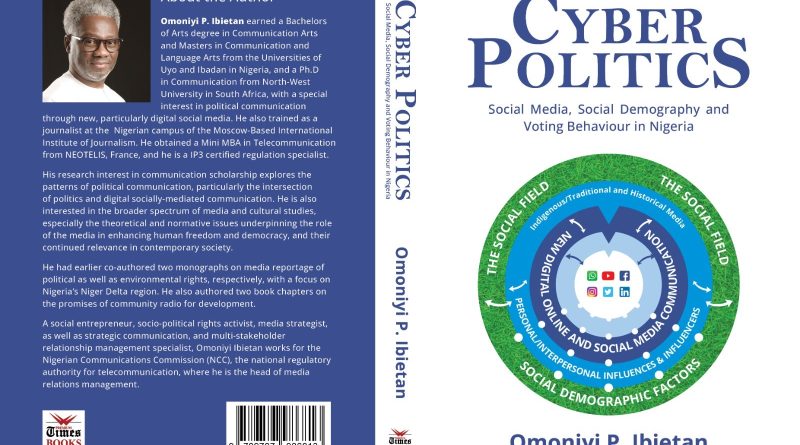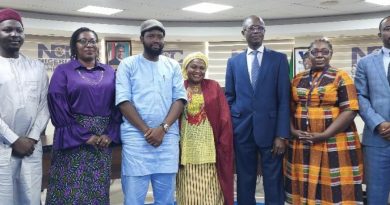Review of Cyber Politics – Social Media, Social Demography and Voting Behaviour in Nigeria: Full Text
Book Review on Cyber Politics by Azu Ishiekwene
Title: Cyber Politics – Social Media, Social Demography and Voting Behaviour in Nigeria
Author: Dr. Omoniyi P. Ibietan
Publisher: Premium Times Books
Year: 2023
Pages: 460
Reviewer: Azu Ishiekwene
Date: July 25, 2023, Abuja, Nigeria
My job today is to review the book, and not the man. But since the man made the book, I would, to slightly paraphrase Oscar Wilde, overcome by yielding to the temptation of reviewing the man.
In case you didn’t know the meaning of the “P” as it appears in the middle of the author’s name on the cover of the book for review, “P” is for “Paul”, the famous cousin of “Peter” in many nursery rhymes.
Another quick disclosure, perhaps a not-so-secret one. Whatever his current bourgeoise pretensions, the author was a former student’s union leader first at the Kwara State College of Technology, Ilorin, and later, at the University of Abuja, where he was rusticated in the famous case of Niyi Ibietan & 45 others v. University of Abuja & 2 Others.
The author, whose parents are from the old Kwara State, later re-enrolled at the University of Uyo. As a result of the disruption caused by his activism, it took him 10 years to obtain his First degree; but when he did, he did so in style. He finished top of his class. A great relief, as you can imagine, for his long-suffering parents who had during his childhood, also endured the scare of rashes that nearly claimed his life within the first six months of birth in Kaduna.
Enough said about him for now, though later, you might see the link.
To the subject matter: Cyber Politics – Social Media, Social Demography and Voting Behaviour in Nigeria. When I first voted in an election in Nigeria in 1983, the Internet was just newly born. It had not even been properly named.
Forty years later when I voted for the fifth time, my daughter who attained voting age only 13 years ago and has since voted only once, as far as I know, was telling me from thousands of miles away, where she now lives with her family, how she thought I should have voted and for who.
This was by no means a unique experience. A very close friend and managing director of one of Nigeria’s leading media houses told me at the height of the 2023 elections that the politics of who to vote for and why so polarised his home that he had to convene a family meeting where it was decided that all political talk was off limits until after the elections.
But Cyber Politics is not about the last general election and filial squabbles. It’s a deeper phase in the exploratory journey of Niyi P. Ibietan whose interest in political communication and its sociology go back to his early student days.
What started, perhaps as mere curiosity in his undergraduate days and in his early working life about the role of the media in enhancing freedom, soon found expression in his journalism and monographs. This passion, which later deepened in his Master’s dissertation, has crystalised in the formidable academic work that is the subject of this review.
In 12 chapters of 460 pages including the bibliography set against the background of Nigeria’s 2015 general elections, Cyber Politics examines the theme of cyber culture, social demographics and political communication. It is a subject that evokes decades of research, but which nonetheless retains its fascination as scholars continue to explore the fraught question of why voters behave the way they do, especially during elections.
Seventy-five years ago, or so, when another Paul, Paul Lazarsfeld (Berelson, Lazarsfeld, & McPhee) took this question to the streets of North Carolina after the US Presidential election to ascertain what influences voter behaviour in what is now famously called the Columbian studies, the researchers concluded that media and campaigns have minimal effects on voters.
Or to adapt Bernard Cohen’s famous phrase, the press was increasingly vital in awareness and relevance, but not necessarily in voter behaviour and attitude.
Keep in mind that before Lazarsfeld and others conducted the Columbian studies, contributions from social psychology in the 1930s, especially following the impact of Hollywood which was then on the rise, and Hitler’s exceptional propaganda in the War, had created the impression that people were like “sitting ducks” for information.
In technical jargon, this view of knee-jerk reaction to information consumption was called the “Hypodermic Needle” theory. The social context for it in Europe at the time was that it was unlikely for Hitler, especially, to have succeeded, if individuals had not become isolated, atomised and left completely vulnerable to the “bullet” of propaganda.
By the time Marshall McLuhan wrote the Gutenberg Galaxy (1962), expressing the view that instantaneous communication would undermine geographically based




